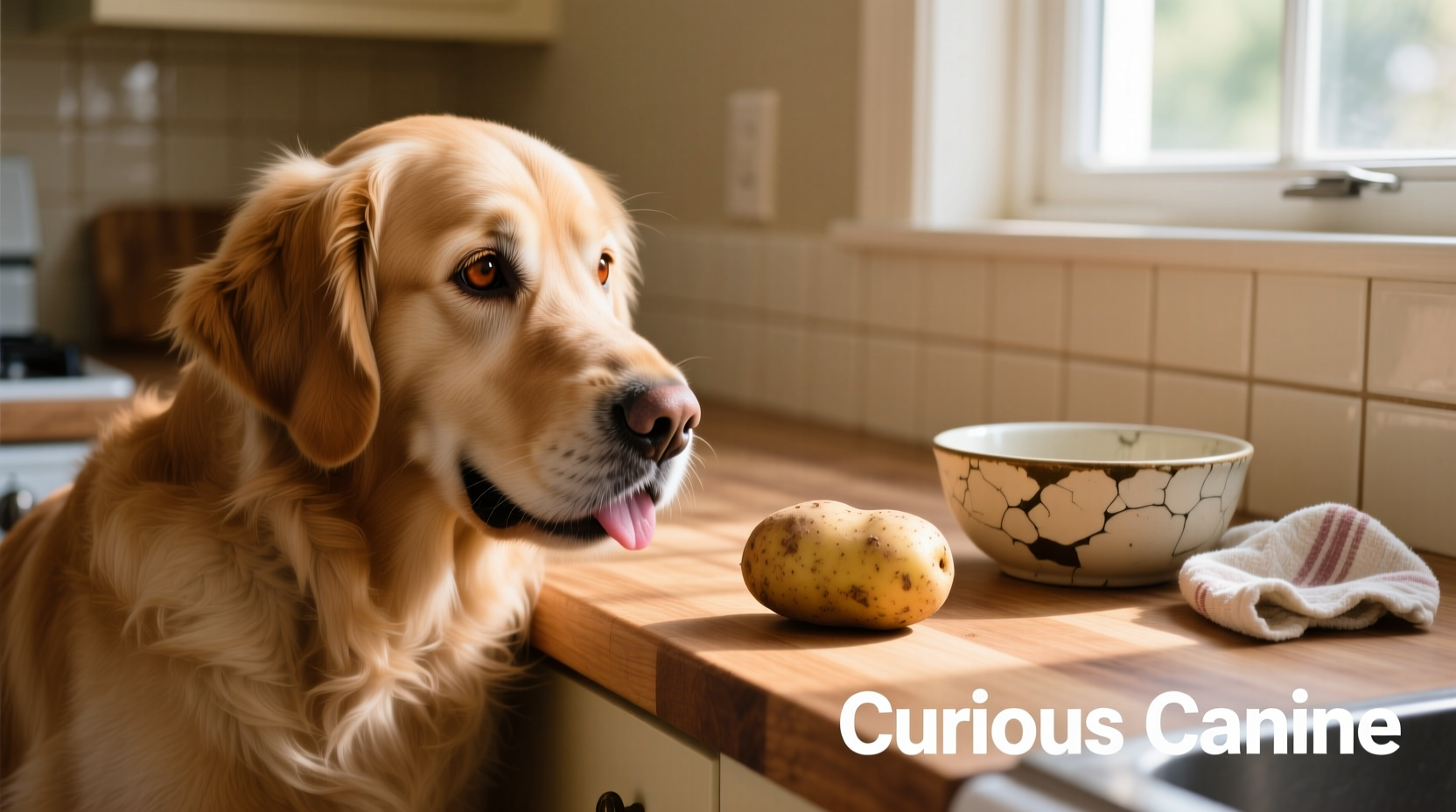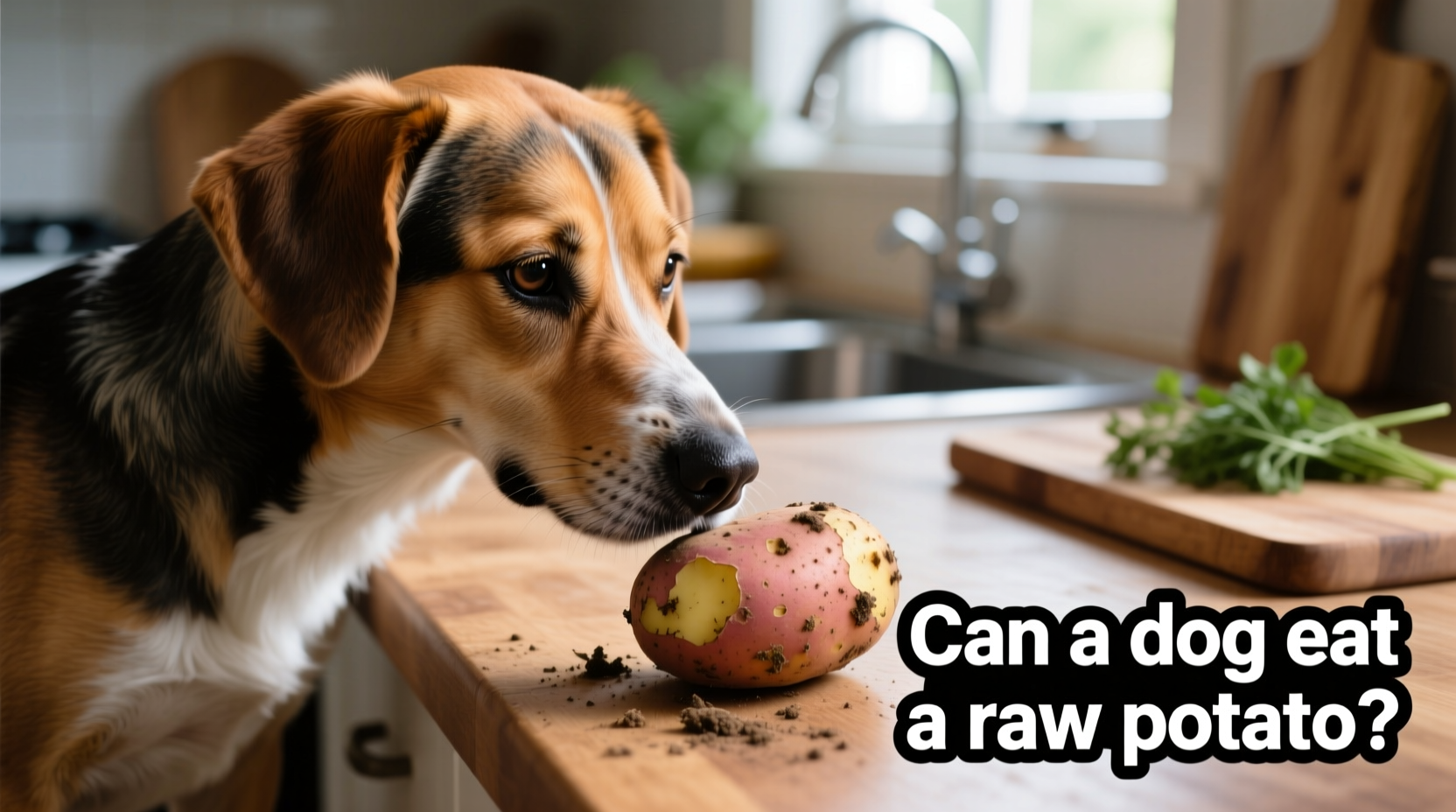As a pet owner, discovering your dog has nibbled on a raw potato can trigger immediate concern. Understanding the real risks and knowing exactly what to do can make all the difference in your pet's wellbeing. Let's explore the science behind why raw potatoes pose a danger to dogs and what practical steps you should take.
Why Raw Potatoes Are Dangerous for Dogs: The Solanine Factor
Raw potatoes belong to the nightshade family (Solanaceae), which contains naturally occurring compounds called glycoalkaloids, primarily solanine and chaconine. These substances serve as the plant's natural defense mechanism against pests and fungi.
While humans can typically process small amounts of solanine without issue, dogs metabolize these compounds differently. According to research published in the Journal of Veterinary Pharmacology and Therapeutics, canines lack certain enzymes that help break down glycoalkaloids efficiently, making them more susceptible to toxicity.
The concentration of solanine is highest in:
- Green or sprouted areas of potatoes
- Raw potato skins
- Young potato plants
Even a small amount of raw potato can cause discomfort in smaller dog breeds, while larger dogs might tolerate slightly more before showing symptoms—but no amount is considered completely safe.
| Characteristic | Raw Potatoes | Cooked Potatoes |
|---|---|---|
| Solanine Content | High (especially in green/sprouted areas) | Significantly reduced by proper cooking |
| Digestibility for Dogs | Poor - difficult to break down | Good when plain and fully cooked |
| Recommended for Dogs | Never | Occasionally in small portions |
| Primary Risk | Solanine poisoning | Weight gain if overfed (no toxic risk) |
Symptoms of Solanine Poisoning in Dogs: What to Watch For
If your dog has eaten raw potato, symptoms typically appear within 8-24 hours. The severity depends on the amount consumed relative to your dog's size and the potato's solanine concentration.
Mild to moderate symptoms include:
- Vomiting and diarrhea
- Excessive drooling
- Lethargy or weakness
- Abdominal pain
- Loss of appetite
Severe symptoms requiring immediate veterinary attention:
- Tremors or seizures
- Difficulty breathing
- Confusion or disorientation
- Irregular heartbeat
- Paralysis in extreme cases
The American Kennel Club's Canine Health Foundation notes that "solanine affects the gastrointestinal system, the nervous system, and can even impact cardiac function in severe cases." Smaller breeds, puppies, and dogs with pre-existing health conditions face higher risks from the same amount of raw potato compared to larger, healthier adult dogs.
Immediate Action Plan: What to Do If Your Dog Ate Raw Potato
Discovering your dog has eaten raw potato requires prompt, thoughtful action. Follow these steps:
- Assess the situation: Determine approximately how much raw potato was consumed and note if it was green, sprouted, or included the skin (higher solanine content).
- Do not induce vomiting unless specifically instructed by your veterinarian, as this could cause additional complications.
- Contact your veterinarian immediately with details about the incident. The ASPCA Animal Poison Control Center (888-426-4435) is available 24/7 for emergencies.
- Monitor closely for the next 24-48 hours for any developing symptoms, even if your dog seems fine initially.
- Provide supportive care as directed by your vet, which may include fluid therapy or medications to manage symptoms.
According to veterinary guidelines from the American Veterinary Medical Association, "early intervention significantly improves outcomes in cases of potential solanine toxicity." Your vet may recommend activated charcoal to prevent further absorption of toxins if the ingestion was recent.
Safe Potato Alternatives for Dogs: Healthy Treat Options
While raw potatoes are dangerous, properly prepared potatoes can occasionally be part of your dog's diet:
- Cooked plain potatoes: Boiled or baked without seasoning, in small portions (no more than 1-2 tablespoons for small dogs, 1/4 cup for larger dogs)
- Sweet potatoes: An excellent alternative that's rich in beta-carotene and fiber (always cooked)
- Pumpkin: Plain canned pumpkin (not pie filling) supports digestive health
- Cucumber slices: Low-calorie crunchy alternative
Remember that potatoes should never exceed 10% of your dog's daily caloric intake. The Association of American Feed Control Officials (AAFCO) emphasizes that "treats and supplemental foods should complement, not replace, a complete and balanced diet formulated for dogs."

Preventing Future Incidents: Kitchen Safety for Dog Owners
Preventing access to raw potatoes is the most effective safety measure. Implement these practical strategies:
- Store potatoes securely: Keep raw potatoes in closed cabinets or pantry areas inaccessible to dogs
- Supervise kitchen activities: Never leave unattended raw potatoes on countertops
- Dispose of potato scraps properly: Use lidded trash cans that dogs cannot open
- Train your dog: Teach "leave it" and "drop it" commands to prevent consumption of dangerous items
- Be vigilant during gardening season: If you grow potatoes, fence off garden areas to prevent access
Consider that some dogs develop counter-surfing habits. The Humane Society recommends using positive reinforcement training techniques rather than punishment when addressing these behaviors. Consistent training helps dogs understand which behaviors earn rewards and which don't.
When Cooked Potatoes Might Still Pose Risks
Even when properly cooked, potatoes present certain limitations for canine consumption:
- Diabetic dogs: High carbohydrate content can affect blood sugar levels
- Overweight dogs: Potatoes are calorie-dense and can contribute to weight gain
- Dogs with pancreatitis: Additional fat from butter or oil used in preparation can trigger flare-ups
- Allergic reactions: Though rare, some dogs may have potato sensitivities
Always introduce new foods gradually and watch for adverse reactions. The Merck Veterinary Manual advises that "any dietary change should be implemented slowly over 7-10 days to allow the gastrointestinal tract to adjust." Consult your veterinarian before adding potatoes or any new food to your dog's regular diet, especially if your pet has existing health conditions.
Conclusion: Prioritizing Your Dog's Safety
While the occasional small amount of cooked plain potato won't harm most dogs, raw potatoes present a genuine health risk due to solanine content. Understanding the signs of toxicity and knowing how to respond can protect your canine companion from unnecessary suffering. When in doubt about any human food's safety for your dog, always consult your veterinarian before offering it as a treat.











 浙公网安备
33010002000092号
浙公网安备
33010002000092号 浙B2-20120091-4
浙B2-20120091-4